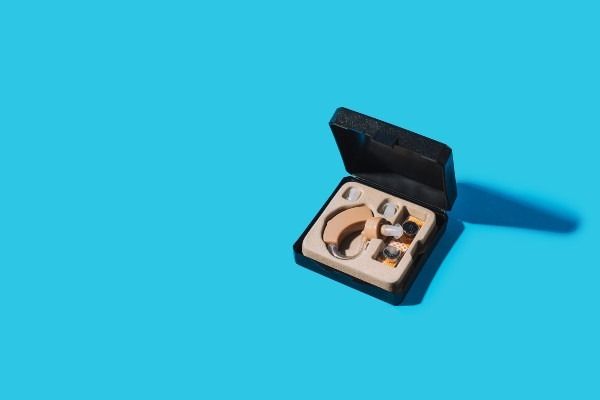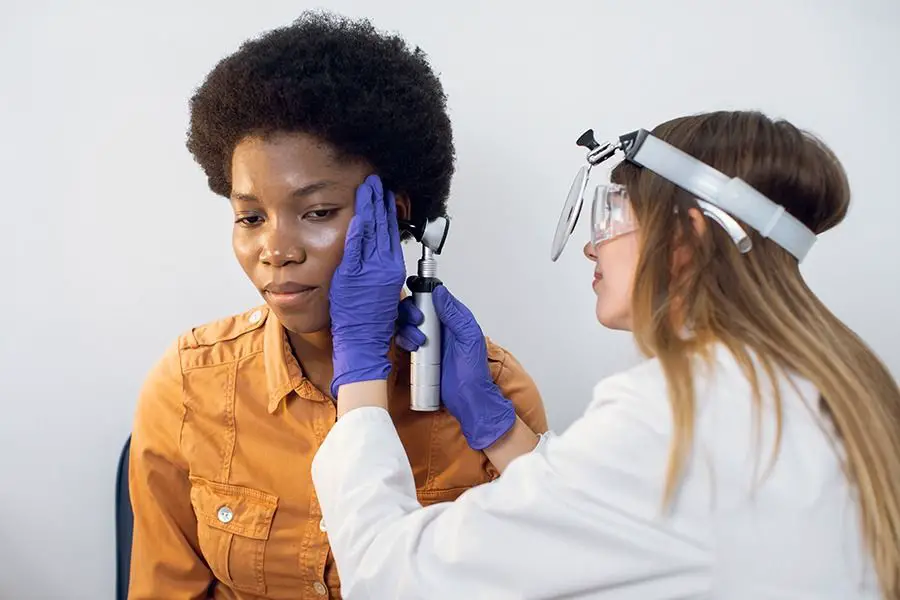Introduction
In the pursuit of safeguarding our children’s health, knowledge is indeed power. When faced with the term ‘sensorineural hearing loss’, it’s crucial to understand what it means and its potential impacts. This type of hearing loss is the most common form and occurs when there’s damage to the inner ear or to the nerve pathways from the ear to the brain. This informative guide aims to shed light on various aspects of sensorineural hearing loss, including its link with aging, its effects on balance, speech comprehension, and psychological wellbeing, as well as the professions most at risk. Our goal is to provide you, as parents, with a comprehensive understanding of this condition to better support your child’s developmental journey.
Professional Re-Chargeable Hearing Aid
Experience Exceptional Sound Quality with Vivtone RIC02, a professional RIC hearing aid featuring a receiver in the canal design. Enjoy superior sound fidelity, reduced distortion, and minimal feedback. With a remarkable 51dB peak sound gain, it surpasses many other devices, catering to a wide range of hearing loss levels.
State-of-the-Art Technology awaits you with Vivtone RIC02. Designed with US-made components from renowned brands like Intricon and Knowles, this advanced device offers exceptional quality at a fraction of the cost. The built-in 30mAh steel-sealed lithium polymer battery charges rapidly in just 1.5 hours and provides an impressive battery life of over 20 hours.
Reliability and Water Resistance come hand in hand with the Vivtone RIC02. Secure your device with the included lanyard and clip, preventing accidental loss. With an IP65 rating, these hearing aids are resistant to water, sweat, and raindrops, assuring longevity and durability. Give the perfect gift to your seniors and loved ones, as this device combines functionality with an appealing appearance and packaging.
Exploring the Link Between Aging and Sensorineural Hearing Loss
Aging is a significant risk factor for sensorineural hearing loss, with a condition known as presbycusis, or age-related hearing loss, affecting many older adults. As we age, the hair cells in our cochlea (inner ear) gradually lose their ability to send signals to the brain, leading to sensorineural hearing loss.
One key point to remember is that presbycusis usually occurs gradually, often affecting both ears equally. It is characterized by a progressive loss of hearing, particularly for high-frequency sounds such as those of birds or the ticking of a clock. While aging is a natural process, understanding its association with sensorineural hearing loss can help in early identification and management of the condition.
How Does Sensorineural Hearing Loss Impact Balance?
The inner ear, besides its crucial role in hearing, also plays a fundamental role in maintaining balance. Specifically, the vestibular system, located within the inner ear, helps control balance and eye movements. If damage occurs within this system, symptoms can range from dizziness and vertigo to problems with balance and spatial orientation.
Sensorineural hearing loss, when severe, can sometimes be accompanied by damage to the vestibular system. This connection can result in balance problems, especially in individuals who have hearing loss in both ears. Being aware of this potential effect of sensorineural hearing loss is vital, as balance issues can impact a child’s motor development and overall quality of life.
Childhood Sensorineural Hearing Loss How It Can Impact Development
Sensorineural hearing loss can have significant impacts on a child’s development, especially when it comes to speech and language acquisition. Children learn to speak and understand language by listening to the speech of others. When a child has hearing loss, this process can be disrupted.
Children with sensorineural hearing loss may not only have difficulty understanding and producing spoken language, but may also experience delays in other areas of development. For example, they may have difficulty with social skills, as these often rely heavily on verbal communication. Furthermore, sensorineural hearing loss can impact academic achievement, particularly in areas like reading and writing that are closely tied to phonetic understanding.
Affect of Sensorineural Hearing Loss on Speech Comprehension
Sensorineural hearing loss not only impacts the ability to hear sounds but can also significantly affect speech comprehension. This is because the condition often leads to a loss of clarity rather than a complete loss of sound. For a child, it may sound as if everyone around them is mumbling or not speaking clearly.
Specifically, sensorineural hearing loss often results in difficulty hearing high-frequency sounds, which include consonants like f, s, th, and t. These sounds are crucial for understanding speech, and their loss can lead to misunderstandings and communication frustrations. It’s important to remember that these children might hear but not understand, a distinction that is crucial for parents and teachers alike.
CBD for Tinnitus: Can It Stop the Ringing?
Unpacking the Psychological Impact of Sensorineural Hearing Loss
Dealing with sensorineural hearing loss can also have significant psychological impacts. Children with this condition may experience feelings of frustration, isolation, and even depression. They may find it difficult to socialize or participate in group activities due to their inability to communicate effectively, leading to feelings of exclusion and loneliness.
There’s also the issue of self-esteem. Children with sensorineural hearing loss may feel different from their peers, which can impact their self-confidence. It’s important to address these psychological aspects of hearing loss, with support ranging from counseling to social skills training, to ensure that your child doesn’t just manage their condition, but also thrives despite it.
QUIZ - SYMPTOMS OF HEARING LOSS
Could You Be at Risk? Professions Prone to Sensorineural Hearing Loss
Certain professions carry a higher risk of sensorineural hearing loss due to their exposure to loud noise. These include professions in the construction and music industries, where exposure to high decibel levels is part of the job. Factory workers, farmers, and military personnel also face an elevated risk of noise-induced sensorineural hearing loss.
For instance, a study on musicians showed that they were almost four times more likely to develop sensorineural hearing loss than their non-musician counterparts. Similarly, reports suggest that around half of all construction workers experience noise-induced hearing loss. Being aware of these risks can guide crucial decisions about hearing protection in the future for your child.
Conclusion
As we wrap up this insightful journey into the world of sensorineural hearing loss, it’s important to remember that knowledge is power. By understanding this condition, its causes, and potential impacts, we can better protect and support our children.
We’ve unpacked the link between aging and sensorineural hearing loss, and explored how it can affect balance and contribute to developmental issues. We also discussed how sensorineural hearing loss impacts speech comprehension and the psychological challenges it can bring about. Lastly, we identified professions prone to this condition, highlighting the importance of adequate hearing protection.
While sensorineural hearing loss presents challenges, it’s also important to remember that there are many resources and tools available for support. Early intervention, education, and the right supportive strategies can enable children with sensorineural hearing loss to lead fulfilling lives. As parents, your understanding and advocacy will play a critical role in their journey.









